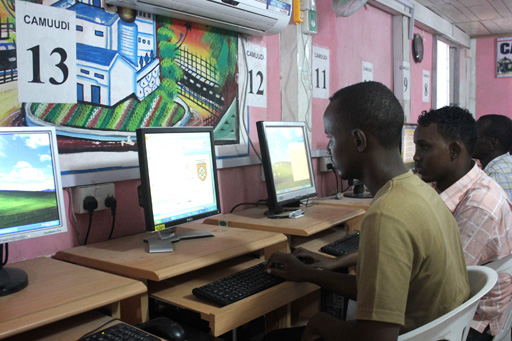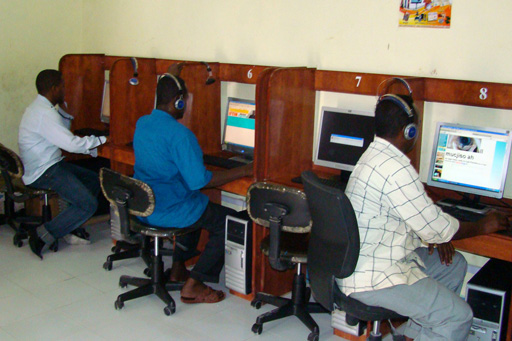
Monday, October 15, 2012

Young Somalis browse the internet at Amudi Internet Café in Mogadishu. [Mahmoud Mohamed/Sabahi]
A number of telecommunication companies in Somalia -- major players include Global Internet, Golis Telecom, Telesom and Somtel -- are competing to provide internet services to customers and cafes throughout the country through a variety of microwave, satellite and fibre-optics networks.
"In 2000, internet users amounted to less than 1% [of the population], but the rate has gone up over the past couple of years until it reached around 2% in 2011, according to unofficial estimates," said Abdisalam Mohamed, marketing director at Global Internet, one of the largest internet providers in central and southern Somalia.
Mohamed said companies in Mogadishu are now offering a variety of internet services for private establishments, such as DSL, wireless and mobile satellite broadband.
Despite the availability, at-home service remains inaccessible for many Somalis due to the high cost. "The [service] costs range from $30 to $600 per month, based to the level of service and connecting speed used by the subscriber," Mohamed said.
Internet cafes are found throughout the streets of Mogadishu as an alternative, offering affordable prices for Somalis users, says Ahmed Sheikh Nur, owner of an internet cafe at the Banadir Intersection.
"It costs $0.70 per hour to use the internet at cafes," Nur told Sabahi, adding that most people still use cafes instead of buying home access. "Some of the obstacles facing Somalis when it comes to providing this service in their homes is that they cannot afford the costs of electricity, computers and landlines."
He said most patrons of internet cafes are between 16 and 29 years old.
Abdikadir Dahir, who studies information technology at Simad University, said internet users at Mogadishu's cafes face a multitude of obstacles, the most prominent of which is low speed.
"Speed at most internet cafes does not exceed 100 kilobytes per second," he said. "When we want to download a file that is one gigabyte, it takes several hours and we just cannot bear the wait, but if we had high speed [internet], we would not be facing such problems."
"Because of low bandwidth at internet cafes, internet users cannot use YouTube or download films and music. For this reason, young people go to internet cafes in the evening when broadband speed is higher than in the morning."
He said he browses the internet in the evening to do research and use social media websites to stay in touch with friends and family members living abroad.
As for internet access via mobile phones, Hormuud Telecom Somalia launched a first of its kind service at the end of last year on a trial basis using General Packet Radio Service (GPRS) technology. The speed of this service, however, does not exceed 50 kilobytes per second at best.
Hassan Yusuf, deputy executive director of marketing for Hormuud, said the GPRS service would be free during the trial period, but subscribers have to pay an upfront $2 registration fee.
"Hormuud plans to expand its internet service via mobile phones and launch a high speed 3G service in the near future," Yusuf told Sabahi.

Customers at the Golden Internet Café in Garowe. [Hassan Muse Hussein/Sabahi]
Providing internet to homes in Puntland
In Puntland, internet service started 12 years ago with low-quality service that was weak and unreliable. Open competition, however, has improved the service over the years and made it more reliable.
Jama Said Barako, 30, long-time manager of the Juba Internet Cafe in Bosaso, said that although internet cafes remain popular, the increased prevalence of home access has significantly reduced their necessity.
"Bosaso used to have up to 40 internet cafes that were really busy," he said. "With the increase of internet [accessibility] and people using it through their mobiles, customers have decreased and some of [the cafes] have closed."
Golis Telecom is the largest company that provides internet service in Puntland. It started as a dial-up but has since facilitated the use of General Packet Radio Service (GPRS) in mobile phones.
"If you look at world, the internet has become an essential tool. Even though we do not have [fibre optic cable], we have worked hard to implement internet service through foreign companies via satellite and through Djibouti via a microwave system," said Omar Isse Mohamed, marketing manager of Golis Telecom company.
He told Sabahi that most people, especially those who live in rural areas, cannot afford internet service.
"We are now working on 3G mobile service and it looks like people are increasingly in need of it," Mohamed told Sabahi, adding that the company only requires a permanent address in order to provide service.
Abbas Abdirahman Salwo, Orbit Telecom sales manager in Bosaso, said his company serves Galkayo, Burtinle, Garowe and Bosaso, and is in the process of expanding services to other regions.
Salwo said Orbit's service in Puntland utilizes fibre-optic and microwave networks, and provides internet to homes and businesses through Asymmetric Digital Subscriber Lines (ADSL).
Despite the availability of internet in Puntland, companies use equipment that is considered obsolete in the developed world, Salwo said. "It is our plan to bring to our clients modern [equipment that is] now in use in America and China, and I believe it can change a lot of the situations that sometimes give our clients trouble," he said.
Somaliland benefits from competition
Eid Abdullahi, 27, an internet cafe owner in Hargeisa, said the largest service providers in the region are Telesom and Somtel. Africa Online also provides internet services but on a limited capacity.
He said his business attracts about 300 clients per day, most of whom are between 15 and 35 years old. Abdullahi said men and women use the internet to access news, socialise, work and study.
Abdullahi's business operates for five hours in the morning and eight hours in the evening. "Most people come to us at night, and our busiest time is between 6 pm and 11 pm," he said.
Even though new technologies that allow internet access in homes and through mobile connections have reduced the number of customers at internet cafes, these businesses have been spreading rapidly in Hargeisa over the last five years, Abdullahi said. "This is because of the steady increase in the number of people who can afford to learn and use the internet," he said.
Hargeisa resident Mohamed Ibrahim, 31, said he had service at home for two years to facilitate his online study for a master's degree through a foreign university. He said he recently purchased a 3G flash modem for its constant portability.
Mohamud Haji Abdirahman Gadhyare, head of Telesom's international relations and internet services, told Sabahi that about 40% of Somaliland residents use the internet.
Telesom provides internet service through microwave and satellite systems, Gadhyare said, which means the cost cannot be the same as in countries that have access to undersea fibre-optic cables.
He said Telesom has been an internet provider for 10 years and operates throughout Somaliland. He said they provide services to international and local agencies, business places, education centres, internet cafes and homes. Telesom provides internet services such as the telephone-line connections, wireless internet access and 3G mobile broadband, Gadhyare said.
"Internet usage is diverse and affects each sector of society," he said. "Anyone with Telesom mobile, whether in urban or rural settings, can access the internet, which has been made available by the company's GPRS, 3G and 2G services," Gadhyare said.